Would anyone bet against water to prevent stones?
Here is the first of new articles that highlight stone treatments in a simple format. These new articles were provoked by what patients asked for, and by Freakonomics.
Because patients asked for clear answers about treatments, I lifted ‘water’ out of my long article on treatment of calcium stone formers, and simplified the style so the main points stand out. I also suggest betting, something we all understand.
Freakonomics offers a three part podcast about the woeful state of medicine. Doctors, they say, rely on received wisdom, poor clinical trial design, and bad data. At the end I ask you to vote if we kidney stone physicians suffer from these three defects, and by how much. Voting sharpens the mind, or should.
The beautiful ‘Hunters in the Snow’ by Pieter Bruegel the Elder, illustrates water in Chicago these days. Painted oil on panel in 1565, 17 x 162 cm, it hangs in the Kunsthistorisches Museum, Vienna. This image is in the public domain.
Water and the Causes of Stones – Some facts
Supersaturation causes crystals to form and grow – that is physics. Crystals make stones – no crystals no stones. Crystals and stones require supersaturation.
Kidneys supersaturate urine by extracting water in excess of calcium, oxalate, and phosphate, the main stone components. Because promptly eliminated in urine, water in ‘excess’ of needs prevents kidneys from from supersaturating urine as much as they would have otherwise. As a consequence, supersaturation must – not may but must – fall unless the amounts of calcium, oxalate, or phosphate lost in urine rise. Since they do not rise from water alone, extra water must lower supersaturation.
The brain gauges water needs by measuring blood sodium concentration and balances desire and urine loss accordingly. Water in ‘excess of needs’ means more than you would drink if left alone, or in other words more than the brain would dictate. Such excess ensures urine dilution as kidneys promptly remove it.
People who make stones supersaturate their urine excessively even if the actual measured values are no higher or even lower than those commonly found among normal people. The proof is that they make stones. The message is that whatever their supersaturation we need to lower it.
As a corollary, supersaturation itself need not cause stones. Some factors must protect healthy people from their own urine supersaturation. Only research can disclose these protective factors and what defects they may have that foster stones.
How Much Water?
Gallons would do, but few will drink that much. We need the sweet spot – enough but not so much no one will drink it.
In this one panel from a larger set of risk factors in the original article, red bars depict two female cohorts, blue bars men. The vertical axis plots relative risk of becoming a stone former against 7 ranges of 24 hour urine volume.
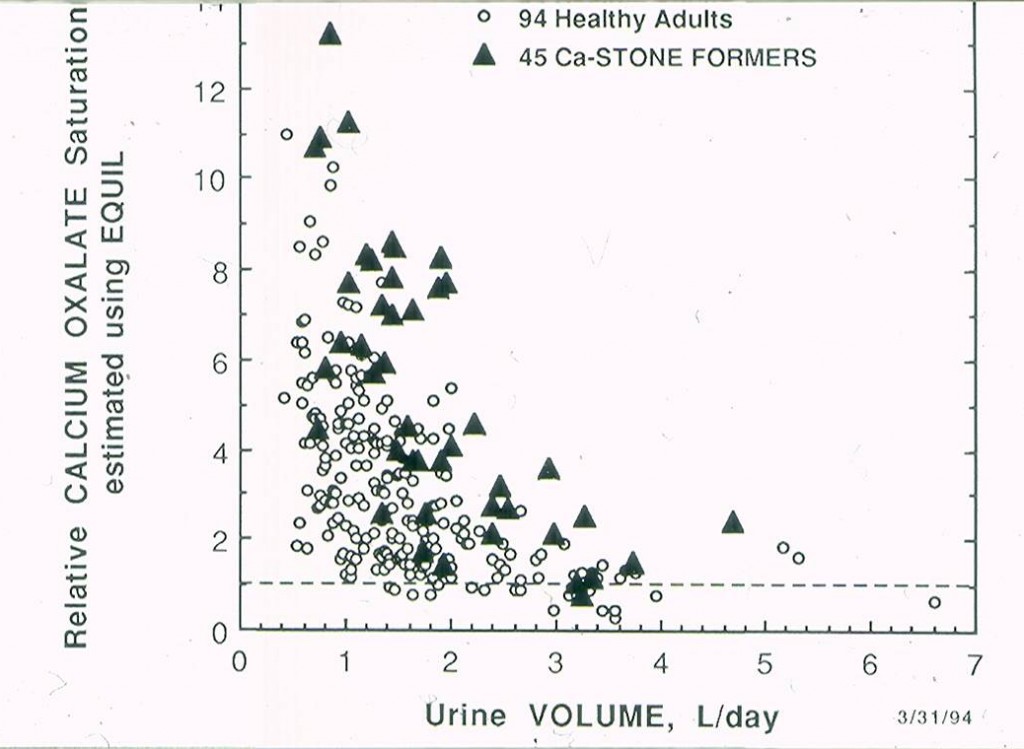 Risk falls rapidly as volume rises, but the bars above the line at 1 – meaning relative risk is really not low enough – remain until about 2.25 liters.
Risk falls rapidly as volume rises, but the bars above the line at 1 – meaning relative risk is really not low enough – remain until about 2.25 liters.
As a complement to this graph, data from Jack Lemann show that urine supersaturation falls steeply with urine volume between 1 and 2 liters. By about 2 to 2.5 liters a day the curve flattens out, so you get less and less benefit from more volume. Because they have more calcium and oxalate in their urine – more stuff to dissolve, stone formers supersaturate urine more – to the right – than do normals at all urine volumes
From both studies we can say about 2.25 liters of urine volume a day should reduce stones. Because we lose water sweating and breathing, we must drink at least 1/2 liter more, or 2.75 liters of fluid a day to get 2.25 liters of urine. Common sense says we must drink more with heat and exercise, and everyone must figure out how much more from experience.
Does Water Reduce Stones?
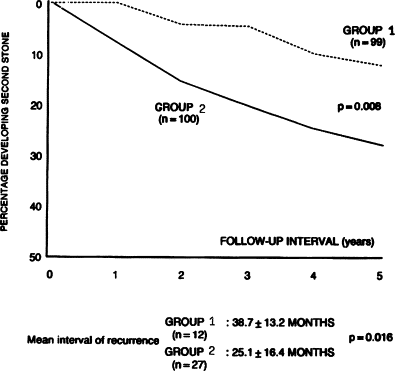 Given the results above, just under 3 liters of water should reduce stones, but does it? Has anyone tried it?
Given the results above, just under 3 liters of water should reduce stones, but does it? Has anyone tried it?
Here is the one trial, in first time calcium oxalate stone formers. Group 2 patients were told to stay hydrated. Group 1 patients were urged to hydrate lavishly and met frequently with nurses who coached them on. Urine volumes at five years were 2.62 liters/day in the Group 1 and 1.01 liters/day in the Group 2 patients.
By five years, 12 hydrated and 27 low flow patients had formed a new stone. Time to first new stone was 38 vs. 25 months, so water delayed the few failures in Group 1.
What about supersaturation? Did water lower it?
Of course it did: CaOx SS 9.9 in the low flow group and 2.6 in the high flow group. For CaP SS, values were 1.58 vs. 0.48. All p values <0.001.
Lets Think About Water
Suppose the National Institutes of Health (NIH) funded trialists to perform another trial.
How Could They Redo the Trial?
Given what we already know, they cannot redo this exact trial. One liter of urine flow a day for five years would condemn first time stone formers to over twice as many new stones as they would have with 2.6 liters of urine a day.
But they could ask if we really need all 2.6 liters of urine flow.
For example they could compare 2.6 liters/day – the volume that worked in this trial – to perhaps 2.25 liters/day. That lower figure comes from the graphs I showed you. At 2.25 liters prospective risk of becoming a stone former is low. In experiments, that urine volume reduces urine supersaturation to its plateau.
Why Should They Redo the Trial?
Less than 2.6 liters of urine, 2.25 or even 2 liters, might do and be less onerous. If a lower volume gave the same results as the higher volume, we could tell our patients they need not drink so much to prevent stones.
How Much Is a New Water Trial Worth?
Let’s put some money on what I just said. Is it worth a million dollars to know that 2.25 or even 2 liters/day of urine will prevent a second stone as well as 2.6 liters/day? Is it worth $100,000 to know that fact?
As you think about this question, remember research money is tax dollars, the amount for kidney stone research is very limited, and what would used for another water trial cannot be used for something else.
Given this, should another trial consume research funds? Would a ‘yes’ answer delight you, make you feel your money had been well spent?
Is Water All We Need?
Maybe water is enough for a first time stone former. But even with drugs prevention is less effective as pretreatment stones mount up.
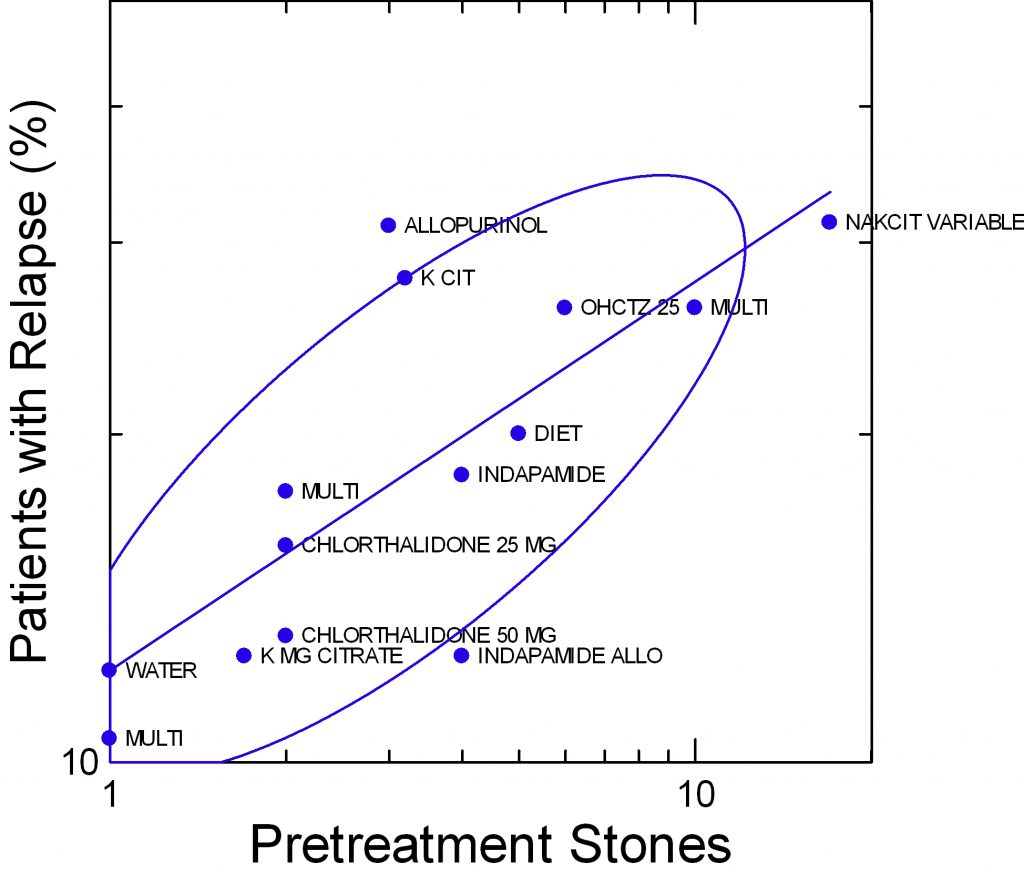 Here are all the trials we have that used medications and hydration. It plots the percent new stones – relapse percent on a log scale from 10% to 50% – against the numbers of stones formed before treatment – log scale from 1 to 20 pretreatment stones. Plotted that way, relapse rate rises with the number of stones.
Here are all the trials we have that used medications and hydration. It plots the percent new stones – relapse percent on a log scale from 10% to 50% – against the numbers of stones formed before treatment – log scale from 1 to 20 pretreatment stones. Plotted that way, relapse rate rises with the number of stones.
Given this pattern, maybe you would want to avoid the second stone as best you can by doing more than water at the beginning.
At the beginning, I not only increase fluids but also advise all the other diet changes that have a good hope of reducing stones because they are safe and because they point patients to eat what experts have fashioned as the ideal US diet. In my clinic – not a trial – patients with one stone given multiple treatments are labelled ‘multi’ on the graph. They have the same outcome – 11% – as those from the trial treated with high fluids – labeled ‘water’. But many were in treatment much longer than 5 years, so they had more time to make new stones.
What About Freakonomics?
Do We Depend on Received Wisdom about Water?
Only that I do more than increase fluids for first time stone formers.
Do We Depend on Poor Clinical Trials about Water?
A trialist always wants another trial, and no doubt statisticians will say, ‘Do more’.
But another trial must be about how much, not whether. This is because the first one was strong and there is good a priori science lurking just behind the curtains – water lowers supersaturations, supersaturation drives crystal formation, stones require crystals.
Do We Depend on Bad Data About Water?
Bad means data are untrue – either not proper measurements, or proper measurements misused to bolster statements to which they do not apply. Between the links and figures I am pretty sure that neither is the case for water as a stone prevention.
Let’s Bet
A new trial compares 2.25 liters to 2.6 liters of urine flow/day to prevent more stones in first time stone formers. Will the lower volume be no less effective than the higher volume. Bets are $1,000. How do you bet?
Let’s Vote
How many NIH kidney stone research dollars would you pay to know if 2.25 liters is as effective as 2.6 liters of urine flow/day to prevent more stones in first time stone formers? Name your price.
Is water for kidney stone prevention based on good data and good trials? Yes, or No.
Are you completely clear about what we know about water as a kidney stone treatment? Yes, or No

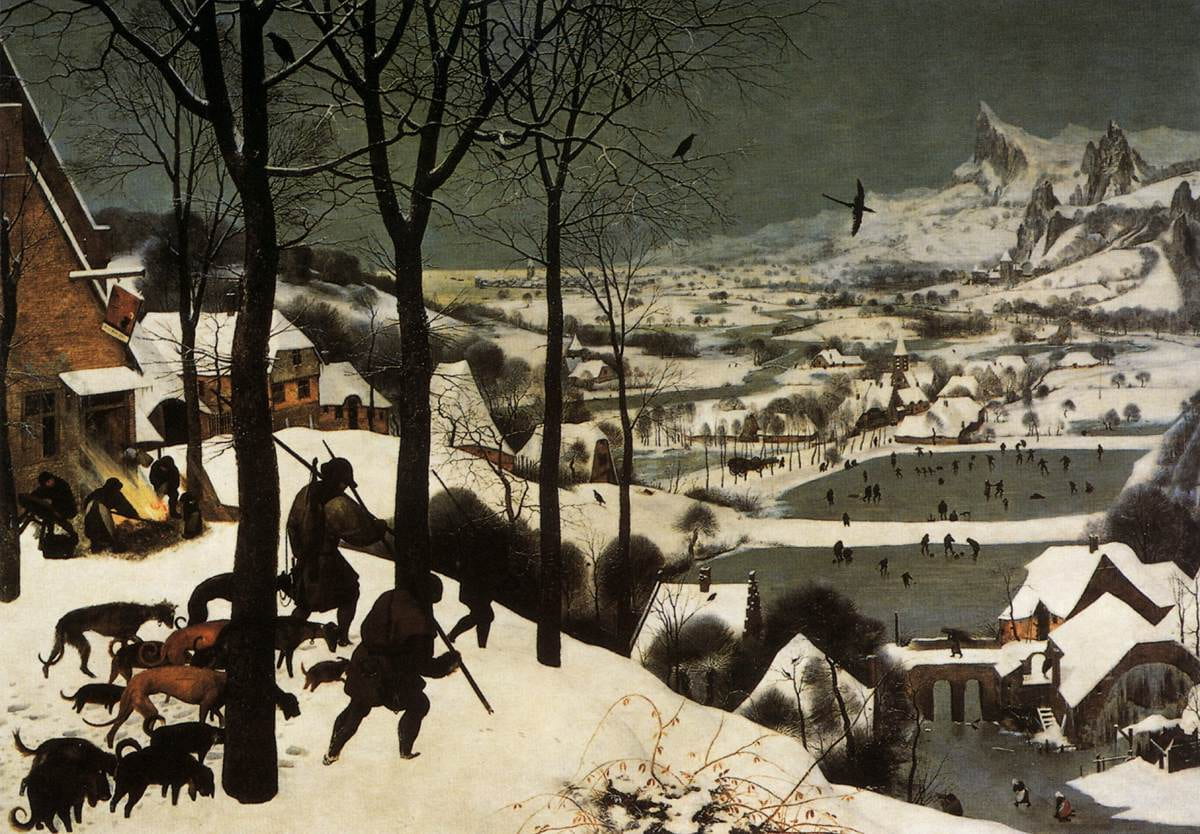

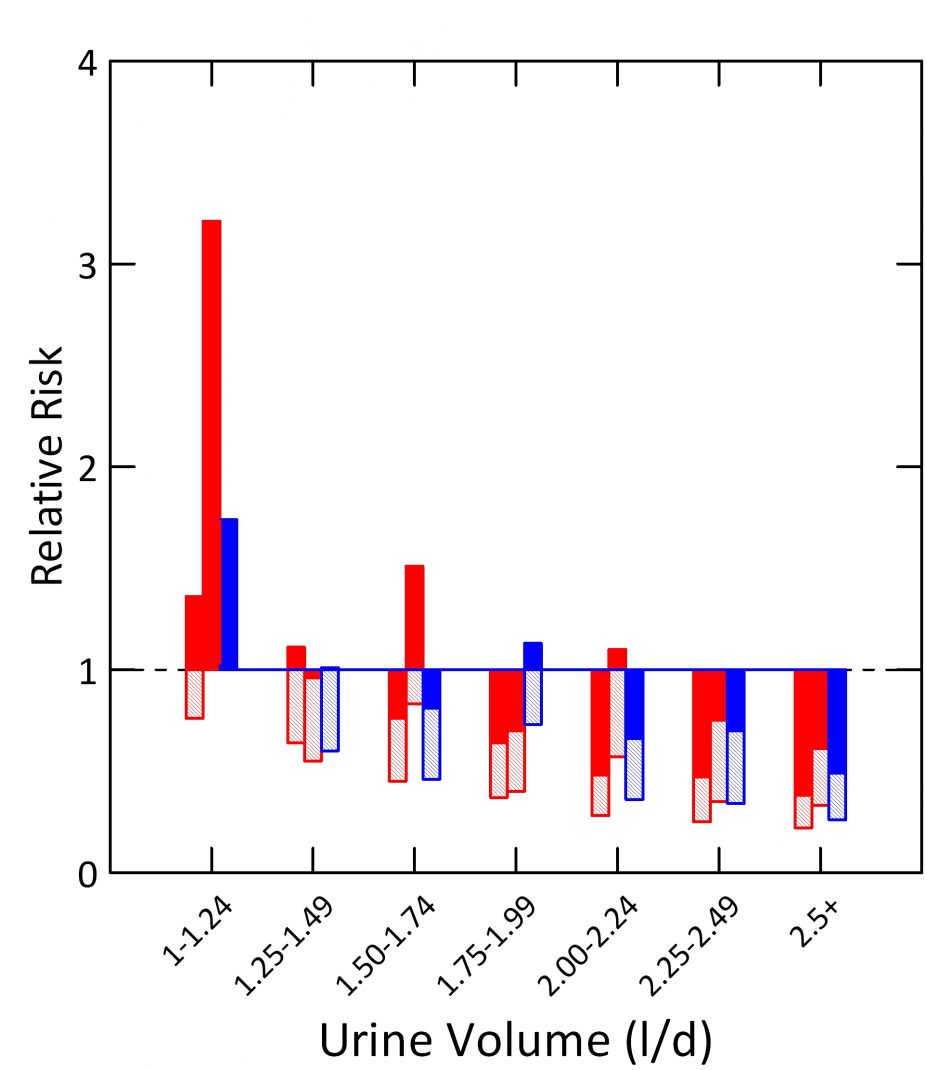
It would be of use to place in ( ) ounces after the liter values decreasing the need to consult conversation tables. I suspect that for many it’s easier to recognize that 2.75 liters (93 oz.) translates to a bit less than 8 12oz. glasses per day.
Hi Jeff, Very good idea. Warm regards, Fred
I originally had 7 stones, one passed test removed and/blasted. Have worked with Jill, HRvard list and mostt of the time drink a bit over 2 liters of h2o a day . I Have , so far , not had any more stones . I certainly support research n trials as I have learned how many people suffer regularly . I gave birth to 9.5 and an 8.5 girls and sone passing right up there. Due for KUB so I’ll know how I am still doing . I am learning much from your articles and yet still struggle with recipe creations some days . I am 116lbs and since stone Diey seem to have activated arthritis , totally left sided. Not sure if there is any connection with diet , vitamins or lack of taking them . More research ha ha . My full hip replacement was a shock as well! Any thoughts, things I should read ? Study to participate in lol? Thank you for your sharing with all of us . Much to learn
Hi Phyllis, thanks for the comment. The stone diet is really that recommended for all US people, and I sure hope it does not activate joint symptoms. Regards, Fred Coe
I do believe you’re right. Such a struggle each day to meet the requirement which for me is at least 80 oz or more. I love water, but by the end of the day after dinner, it’s harder and then getting up twice during the night isn’t great either but anything to prevent these stones! Thank you for all of your well written and informative articles. I read them all.
Regards,
Michele
I would not risk it. I will gladly drink just under 3 liters of water every day of my life to not have a kidney stone. I would also track it for you for free . I think the data is clear. Drink more water. I think the data has proven the point.
Thank you for another informative article. However, I have noticed that if I drink anywhere close to that amount(unless it is hot and humid out or exercising a ton), that I feel sick. I have msk. I actually felt better by having less water. In my case, it seems to be overhydration causing an imbalance of electrolytes causing me to feel sick mainly in the stomach but sometimes with other symptoms as well. Do you have any thoughts on how to feel fine drinking the amount of water you listed? I ask to be prepared for any future stone I might have to pass. Thank you for your time.
Hi Michelle, Drinking more slowly might help so as to avoid lowering serum sodium. But the real clue is urine volume. If your bladder is not filling up regularly there is not enough water. Try other beverages; see Jill’s lists of candidates. Regards, Fred Coe
Dr. Coe,
Another great article. Question: I have increased my water intake to 2.5 L/day and have reduced my oxalate intake. I hadn’t seen how high phosphate could be a factor in stone formation before. I am hypoparathyroid secondary to MEN1 and my endocrinologist to increase serum calcium levels (to appropriate levels) and keep my phosphate levels normal. Of late, my phosphate has spiked. Any comments or suggestions? THANK YOU!
Hi Lisa, hypoparathyroidism is indeed a real stone risk as PTH helps conserve calcium so as blood calcium rises urine calcium will rise a lot. Serum phosphate will be high because of loss of the phosphaturic action of PTH so that is a problem as well, not for stones but for the blood. In general the goal is a level of blood calcium sufficient to prevent symptoms from low blood calcium, with attention to 24 hour urine data to prevent undue stone risk. Serum phosphate will be sensitive to phosphate intake, so bloods need to be fasting if one wants some stability. Regards, Fred Coe
While water is certainly important for supersaturation, I believe (simply based on my own body, and no scientific evidence) that not all people make use of water the same. You can tell me to drink more water until I’m drowning in it, and I would need to urinate every hour, but I might still have dry mouth for example due to the way my body processes water. So my kidneys might also retain/dispose of the wrong amount of water as well. I would think that a person who has dealt with the painful stone would likely follow the doctors advise and drink more water; but does it always solve the problem? Just my naive input.
Hi Laurie, It certainly does not solve all problems mainly because people rarely can maintain even hydration so supersaturations will rise at intervals. It is best thought of as necessary but not sufficient. So you are right to say it does not suffice. As for water intake and renal water loss things are a bit clearer. Kidneys will clear excess water in response to variation in AVP levels which respond to slight changes in serum sodium – I know who you are and that you are a very skilled scientist! Unlike sodium balance that can be irregular over a day or so, water balance tends to be exact and prompt. Maybe I should write an article on this subject? Warm regards, Fred
No I was not really clear answer. I had to read and reread the information before I could figure out what you were saying. I’m not very familiar with some of these termsbut as I get more into my research I’m sure it will get easier.
Hi Pam, Let me know what is confusing as you pursue things. Regards, Fred Coe
Hi Dr. Coe,
I’m not much into betting, but I can vote!
$25
Yes
Yes, with respect to the first order effects, that is.
Come on everyone, the polls are open!
Al
P.S. I plan to post my rationale and comments later, but I don’t want to influence the voting now.
Interestingly, Hippocrates (460-370 BC) reportedly already recognized the importance of diluting urine to prevent stones. I do see value in general health recommendations based on studies to determine what level of fluid will best help a typical person to avoid their first stone. Shout the answer from the mountaintops. But that is water over the dam for all of us already in treatment. Data on averages are little help to us because, as you know, our supersaturations aren’t average or even consistent as a class.
So a very interesting question is how to most effectively manage the quantity and timing of water intake to minimize risky peaks in supersaturations through day and night in order for a particular patient to prevent stone and plaque formation and growth?
Just my 2 cents. Best regards, Al
Hi AL, Thanks for your sage remarks. Fred
Thank you for your article. It dramatically impressed upon me the need to drink all of the pitcher of water on my desk each day. You’ve explained it in words a non-medical professional can understand. I don’t think that there was a single statistic or study referenced – just your direction on what I should do. Beyond that, your style was lovely as well.
Thanks, Don. Fred
Some frustration here… having had a number of stones in my life (and passing one now), and each doctor telling me to “drink more water,” but never able to base that on any real data for me as an individual. There are generalities, but what test could be created/developed to determine what is right for me, my body, my stone production, my issues. I have followed doctor’s advice and do nearly 3L water per day. And stones continue to generate. I follow stone free diet as prescribed by Urologist, and still stones. So… I’m all for additional research… but is there research going on that will evaluate my body… my needs? Where is the research on individual factors? Where is the specific detailed testing for an individual for water consumption? Where is the detailed testing being developed for other stone factors in my body? Am I missing something?
Hi Steve, You are very smart and perceptive. Trials are general and their application to a person is why we have a medical profession in the first place. Of course you may have important special issues that need care. Here is a very good overview of how you should be evaluated for those issues. It links to several more detailed plans as well. I hope this helps lead your physicians in more productive directions for you. Regards, Fred Coe
I don’t think a study to determine if drinking 1/2 of a glass less of water is a good use of research money. If one has been through the pain of kidney stones there should be no hesitation on drinking slightly more water. You have provided a reasonable amount to drink from the previous study that showed it helped to prevent kidney stones. The key is to distribute it throughout the day and night. As a side note I was told by doctor John Aspin that my 24 hour urine output of 8 liters was too extreme and that I should reduce it to about 6 liters. That is why I think patients should just drink water and not try to get by with the minimum. I still drink a lot of water and fortunately have not had any stones since 1996. I have had 3 procedures for stone removal starting in 1974, then1982, then in 1996.
Hi Ron, Good comment – at least I think so and agree with you. Also good there have been no new stones. REgards, Fred
Thank you for this article. I’ve had about 30 stones and had a dozen procedures and will have another next week. I’m still trying to figure it out and your information is helpful.
Hi David, with 30 stones, I would advise you simply read the chapters in the kidney stone book. You deserve better for yourself. Bests, Fred Coe
I am 73 YO and 6 months ago I had surgery for one very large stone. Now I am told to drink more water (at least 2 ltrs).
I don’t care for plain water, so I purchased a carbonator. I like the fizzy water and sometimes I add a small amount of cranberry juice. One doc said that was ok, and another said he was concerned about it lowering my ph. What do you think about drinking carbonated water. (sometimes known as seltzer water). Thank You.
Hi D Everson, If you carbonate it with CO2, fine. Seltzer water as purchased often contains a lot of sodium which is bad. The pH effects of water carbonated with CO2 are trivial. Regards, Fred Coe
Thank You!!
Hi Dr. Coe,
Thank you for your contribution to all of the stone sufferers. Our Urologists just don’t know the research. I just had a uric acid stone blasted in my left kidney a week ago. I don’t want to go through this again. I changed my diet a bit and purchased alkaline pills (Vaxa.com). They immediately next day bring my ph to a 7. Just wondering if potassium citrate would be better for me and if so what would the dose be? I Have no problem consulting you by telephone and paying a fee. I just can’t go through this anymore. It was traumatic and painful. Please inform where I may call you or any advise would be so very much appreciated! Thank you Dear Doctor!
Hi Gail, Uric acid stones – pure ones – are so easily prevented! Take a look. You need 24 hour urines to follow treatment, of course, spot urines are too variable. As well, be sure and get fully evaluated just in case there is more stone risk lurking for calcium stones. This should do. Be sure your physician is in line with what I have said. Regards, Fred Coe
I am new stone former, first experience last week and landed in our local ED. The doctor told me to drink “more water” and, when asked, said I didn’t need to make dietary changes (although he didn’t ask about my diet). No stone was captured so there is no analysis of the type of stones I am forming. So, a couple of questions…does the “water” intake recommendation include liquid from other sources, or in addition to. I drink about 1 litre of skim milk/day plus 1-2 cups of coffee, plus there is water in fruits and veggies. I intend to reduce salt in my diet. However, looking at food with high oxalate content, the list includes some of my favourites. Severely limiting foods like dark green veggies and peanut butter would be a challenge! By the way, so glad I found this site!
Hi Joanne, Although you received conventional advice I am more aggressive about treatment, especially changing to the kidney stone diet. I believe in this because that diet matches the one presently recommended for the whole US population – so why wait? Here is my take. The diet has multiple health benefits, another reason to go ahead. In fact, the diet is for everyone so feel free to use it as you please. Likewise for your family. But – you knew one would show up: Some stone formers have systemic causes for stones and your physician will want to test you now to be sure. That precaution is universal. Regards, Fred Coe
Thanks, Dr. Coe. I will work toward getting on the kidney stone diet! I can see there is a lot of benefit. I have definitely increased my fluid intake significantly. My doctor said my urea (blood test) was high and to drink more H20, which I did. Two weeks later my urea had dropped from 11.0 mmol/L to 8.3 mmol/L and I was told to drink even more. At that point I was already regularly drinking over 3 L/day, and a 24 hr urine test 2 days later had my volume at 3.7L. ( I did my own 24 hr urine collection a number of days after that just to see if the volume was in the same ball park and it was around 3.6L) Could there be another cause for the high urea? Or do I really need to drink more? I am urinating an average of 15 times/day. And, by the way, my 24 hr urine test only included creatinine and calcium. If the other 24 hr urine tests you recommend are not available here in Canada, I may have to make a trip to the US!
Hi Joanne, 11 mmol/l is – in US terms 11 x 28 mg/mmol of nitrogen = 31 mg/dl, very high. Even at 8 mmol/l it is quite high. Do you have kidney disease?Perhaps take steroids, or take in a huge amount of protein?? Was your serum creatinine – an alternative kidney function measure – measured? Very confusing indeed. As for the urine calcium and creatinine, were the values high?? As for more water, because I do not understand what is happening I can say very little except this: water to lower serum urea nitrogen seems an odd thing unless you are perhaps sodium depleted from a diuretic, or have one of the problems listed above. You do not need more water, as a surety. Regards, Fred Coe
Thank you Dr. Coe.
My serum creatinine was 56 mmol/L; my urine calcium was 4.8 mmol/d and urine creatinine 9.2 mmol/d. These were all after increasing my fluid intake to >3 l/day. Curiously, my HgB had gone up to a “high” level of 154 g/L (normally I’m in the 140’s).
I am not aware of having kidney disease (glomerular filtration rate 96 mL/min); I am not on steroids; I am not on diuretics; I take no medications other than Vit D.
Regarding protein intake, I rarely eat meat (average x1/month over the year); I eat fish/seafood average x2-3/wk; most of my protein is from dairy products 3 c. skim milk/day, plus cheese most days, 2-3 eggs/wk, yogurt 2-3 days/wk; and otherwise from veggie sources. Perhaps I should figure out how much protein I am actually getting? I am a small person at 5’3″, 108 lb.
Do you have suggestions regarding what I should ask my doctor to further investigate? Or refer me to a nephrologist? Thank you for your dedication to this subject!
Your creatinine is normal, so the high blood urea nitrogen is something other than kidney disease. I would not be bothered about it. If anyone cares to pursue it, the correct move is to do the 24 hour urea nitrogen – probably it is high, if not then your kidneys are reabsorbing urea rather efficiently. THat your hemoglobin and urea nitrogen both went up speaks for dehydration. Diuretics do this, very low salt diets, lots of exercise. I am not overly concerned. Regards, Fred Coe
I have now had further 24 hr testing done and I have a HIGH urine citrate at 6.8 mmol/d (reference range 1.0-6.0). I can find nothing much online about hypercitraturia, so not sure where to go next with that, but it certainly doesn’t explain having kidney stones. Does this have any relation to vitamin D? I do take a vitamin D supplement, but may get enough in my diet? Otherwise, my results were: urine creatinine 9.3 mmol/d; urine urate 2.5 mmo/d; urine calcium 4.3 mmol/d; urine sodium 61 mmol/d (reference range 40-200); urine phosphate 43 mmol/d (reference range 13-42, so ever so slightly high). I am confused by the high urea and HgB as I was drinking over 3 litres a day and perhaps got about 1/2 hr of vigorous exercise (which is very little really) and it isn’t summer! Do you see anything in my results that might explain kidney stones? Any indication that I should reduce salt in my diet? Other than making sure I drink 2.5-3.0 litres a day, is there anything else you would recommend? Your comments have been very much appreciated!
Hi Joanne, The usual reason I find for high citrate is metabolic syndrome – insulin resistance, obesity, hypertension, lipid disorders. It is not itself a cause of stones. Nor is it related to oral vitamin D use. Your urine sodium seems modest indeed. Do you know the type of stones?? Regards, Fred Coe
In the sense of “do no harm” I get that more water is probably better than less water for stone prevention. Generally I am reading 2.5 liters per day is probably a good goal. My question is does it make sense that a 110 lb female theoretically might need to drink less than a 250lb male… or a 250lb male might need to drink more than the 2.5L?
Hi KD, In the epidemiology studies linking urine volume to new onset stones, sex made no difference. Risk became detectable at 2.3 liters per day of urine volume. So, no. Regards, Fred Coe
Dr. Coe
Does the daily consumption of water that is recommended included coffee, juice and water we get in the foods we eat? If not, Is there is no benefit except for straight H2O?
Hi Don, All fluids count. Foods do not. Regards, Fred Coe
Hello, I have a couple of questions. Does consuming 2-3 servings of whey protein powder a day increase the risk of kidney stone formation? And if I were to drink 0.8-1 gallon of water per day, would it be theoretically impossible or very unlikely to form kidney stones, even with high whey protein consumption?
Hi Michael, the powder will raise urine calcium, and that can raise stone risk. More water will certainly help. The final balance requires 24 hour urine testing and an intelligent analysis of the results. Regards, Fred Coe
I’m confused. I thought the aim was to consume between .8 and 1.0g/day of Kg of body weight of protein. Why would the powder raise the risk of stone formation?
Hi Dave, I had to look up the chain of questions as the article is about water. You mentioned whey powder, and I demurred because you also eat food and with the powder could go over the 1 g/d of protein. If the powder is part of the total of 1 g/d I guess it would not matter. But I also suggested checking a 24 hour urine to be sure urine calcium had not risen from it – a sane check. Regards, Fred Coe
Hello Dr.Coe
thanks for this incredible Website.
1- i have a question… i drink about a Liter of Milk a day + about 2500 IU of vitamin d
does the volume of milk contribute to the overall required number of fluids ( 2.75 or 3 just to be sure and safe ) ?
2- eating meat and drinking Creatine increases the pressure on the kidneys as i have heard… can drinking more and more and more water help with this problem ? can it help the body to not have an increased level of the uric acid ? as a bodybuilder i have to eat alot of meat and proteins for my size , i made a check and it looks like i have a high level of uric acid , i remembered that i do not consume alot of liquids so i thought that doing so while sticking to the high protein diets would help me to stay healthy.
thanks for your time Doctor.
Hi Humanslayer, The milk counts and is great. Lots of water is also beneficial for us all. It is not the creatine or creatinine that affects kidneys, it is the protein itself, but if you are healthy and not a stone former I have no reason to object. High protein diet raises urine calcium, but does not affect bone adversely so far as I can tell. Regards, Fred Coe
I remember reading about how certain types of unfiltered “spring water” contain higher concentrations of minerals, thus actually contributing to kidney stones – IIRC, the article specifically mentioned the Great Lakes region as having higher incidence of kidney stones due to the minerals leeching into the fresh water supply. Unfortunatley, I can’t find that article right now … thus was wondering if you’ve ever heard anything similar or related to this unusual contributing factor to a higher incidence of kidney stones? Thanks!
It’s coming back to me now … something about “hard water” …
https://www.ncbi.nlm.nih.gov/pubmed/9096270
Hi Mark, The article discusses a brand of mineral water as a treatment for stones. Take another look at it. I know of no problems with lake water – go ahead and drink a lot of it. But be sure and get a full evaluation for the cause of your stones and build prevention around it; water is rarely enough. Regards, Fred Coe
I am 57 and have Formed Stones since 27. I am now very committed to your diet and prevention plan.
I have a question about drinking water during the night. I realized I cannot go through the night without drinking water but how much and how often? Let’s say I go to bed at 10pm and drink 8 ounces.
I’m up at 7am and can drink again. Between 10pm and 7 am – I can drink 8 ounces once or twice- maybe 1am and 4am- is that overkill? My bladder wakes me anyway but … I’d hate to be drinking my 2.5 liters per day as recommended but not have enough during my nights. Likewise I’d also like my bladder to get a break too.
Thanks
Julie
Hi Julie, most stone prevention can do without so much bother at night. The trouble with mere water is the trouble you are talking about: too much reliance on one modality. Take a look at a balanced program, and note that nocturnal drinking is not mentioned. I see you have made other comments, but cannot find them, so perhaps you already have read the link. Either way, the only stone disease demanding nighttime fluids is cystinuria. Regards, Fred Coe
I am now eating a low oxalate, low salt diet and increasing my dietary calcium. (All of these things were not heeded by me in the past.) I think I’m easily 2.5 to 3.0 liters of fluid a day. It would great not to worry too about drinking extra water at night. Thank you.
I have just been through experiencing the pain of kidney stone formation and I have just passed the stone. At 67 years old I never had kidney stone issues until…we moved to an area where there is ‘hard’ water. I firmly believe my drinking excess amounts of the ‘hard’ water contributed to my forming a kidney stone. We filter our water now…hoping nothing forms in the future…
Hi Helen, I hope you are right. Be sure about what the stone was made of and that it fits with your hard water idea – your physician will know. Regards, Fred Coe
Hi Dr. Coe,
Do you have an opinion about well water? I am a dietitian and one of my patients recently told me that he uses well water and wanted to know if that is okay.
Thanks!
Hi Marilyn, there are wells and there are wells. In general I know of no special stone risks from hard water, or iron in water. So in general they seem reasonably safe so far as I know. Fred